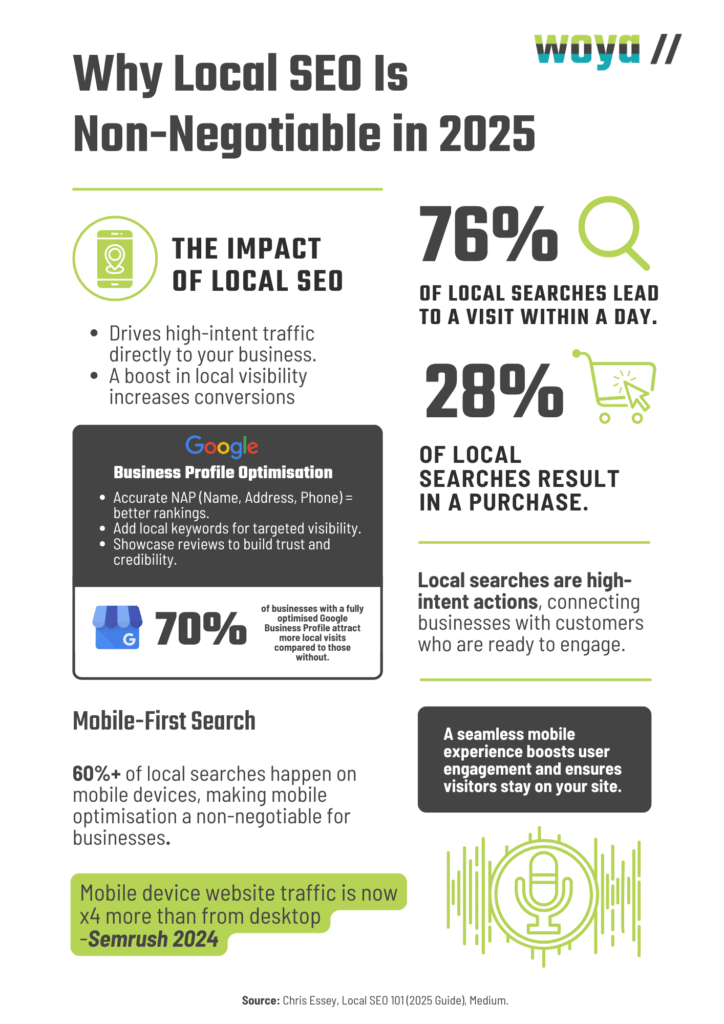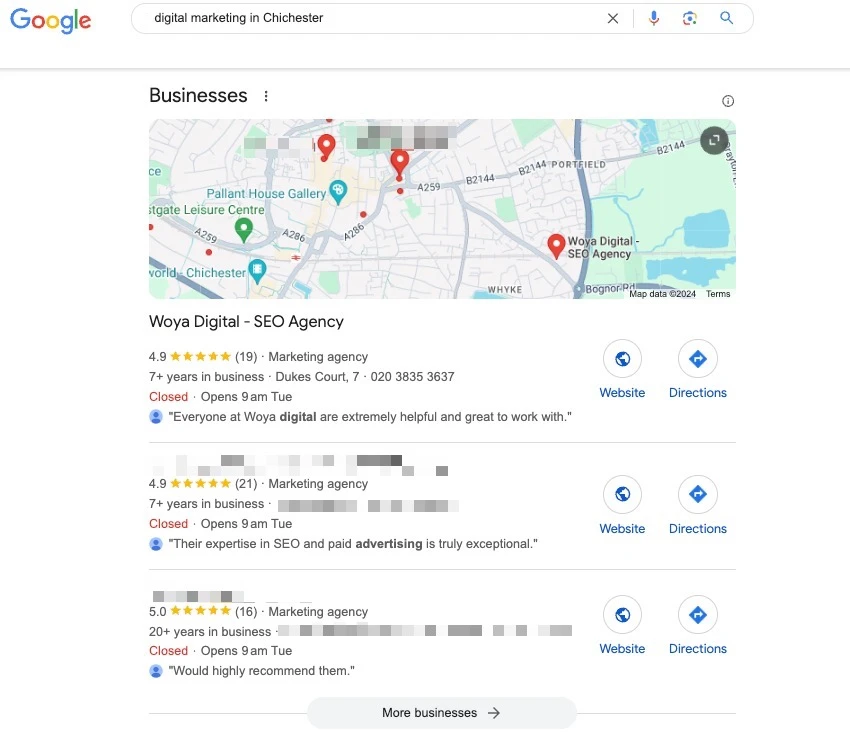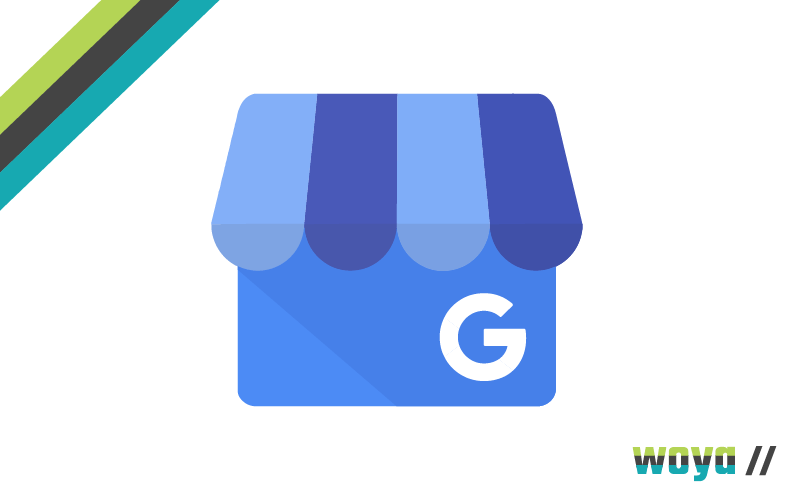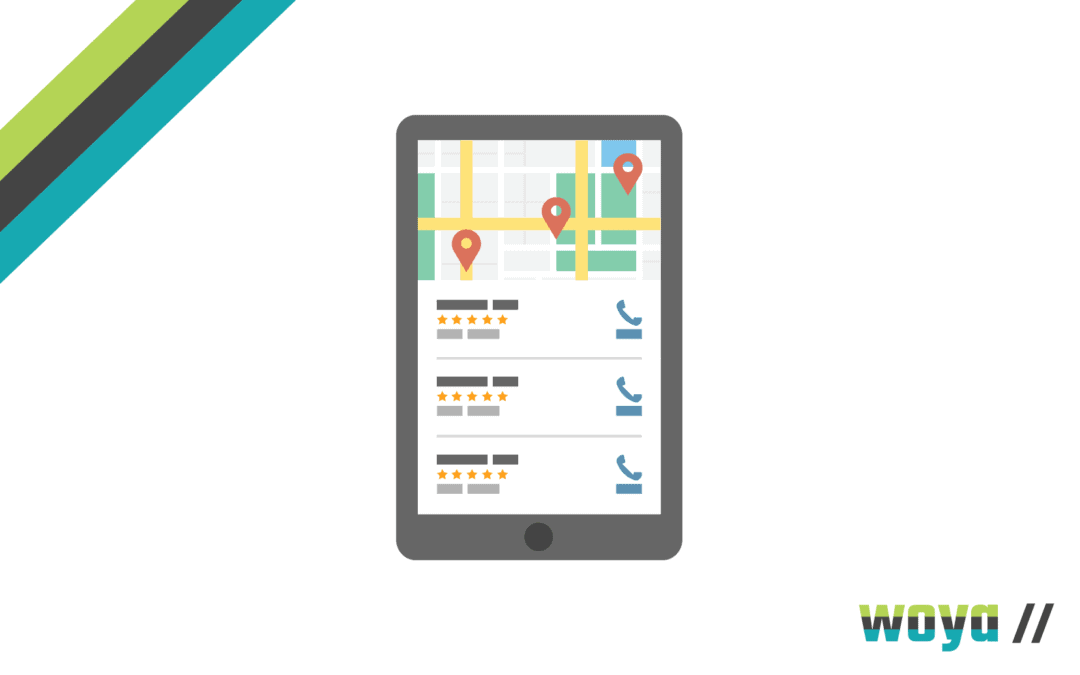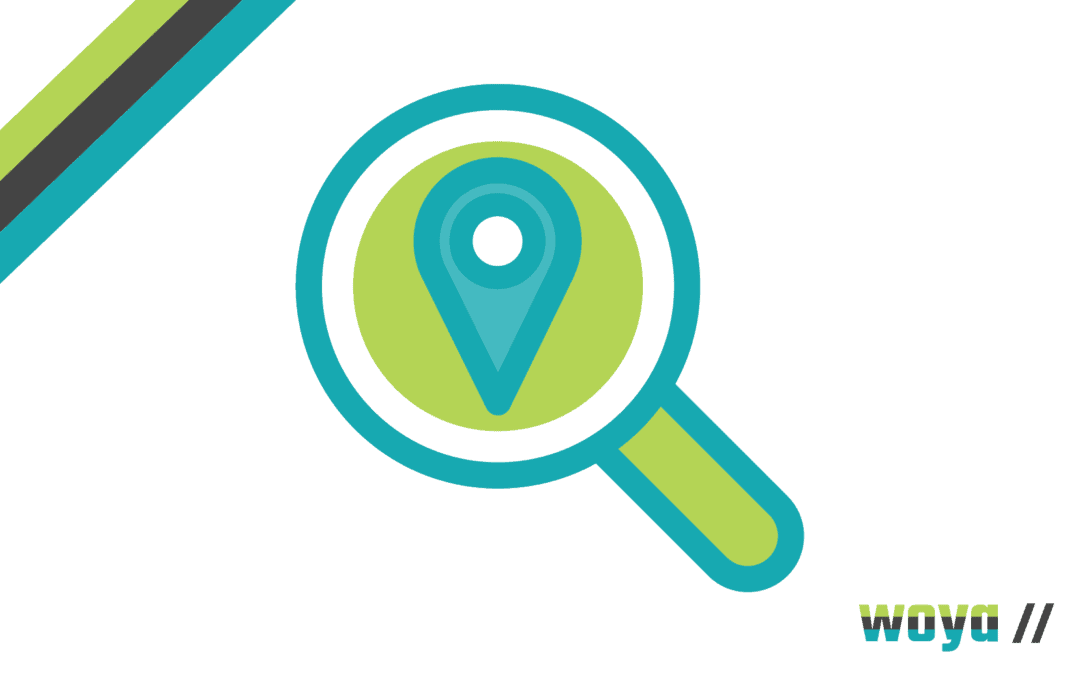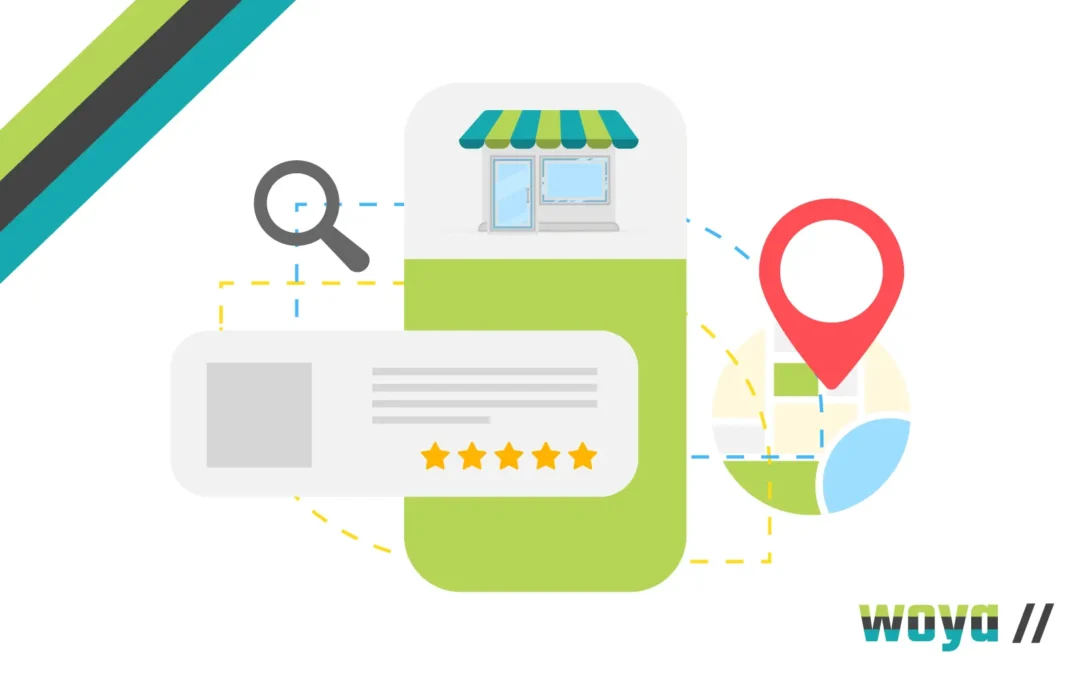
Local SEO For Financial Advisors
Reading Time: 5 minutesStand out among your local competitors and gain a notable, visual online presence, by harnessing the power of local SEO.
Local SEO for financial advisors can drastically boost the quality and quantity of organic traffic to your website and so generate good local leads. With 4 out of 5 Google searchers looking for local information, this is an aspect of your marketing strategy that you should not ignore.
In this guide, we’ll dive deeper into what exactly local SEO is. Whether you’re looking for financial advisor SEO or hoping to attract some new clients for your finance business, give yourself a headstart with our expert advice.
What is Local SEO?
Local search engine optimisation (SEO) is a digital marketing strategy that helps you stand out and rank higher in search engines for online searches in a specific area – usually the town or city your business is based in.
Some of the main core components involved in local SEO include:
- Claiming your Google Business Profile (GBP)
- Optimising your Google Business Profile
- Encouraging reviews from local customers
- Incorporating localised keywords
- Building a network of local citations on local sites (mentions of your business on a website that isn’t your own)
- Creating content with a local focus
Many of these techniques slot neatly into the broader SEO strategy, simultaneously boosting your overall search rankings for non-geographic search queries as well as your local online presence. For example, earning a local citation often comes with an inbound link, which brings far-reaching SEO benefits and boosts your website’s credibility in the eyes of search engines.
Local SEO Services to Boost Financial Advisors Local Search Engine Rankings
At Woya Digital, we always encourage local optimisation for bookkeepers, accountancy, local offices or branches and financial advisors – but, why? Let’s take a look at just some of the reasons we know this is an important digital marketing strategy:
Visibility in Local Search Results
When you Google “digital marketing in Chichester”, do you know whose profile owns one of the top spots? You guessed it – Woya Digital. We’ve worked hard on our local SEO, to ensure we achieve this result.
Hitting those top spots in Google brings a huge amount of visibility from a local audience. When a user searches for financial services in your area, and you’re one of the first results they see, then you’re going to win big on the leads front.
This is because most searchers want a quick solution to their query, and they trust Google to show results that are credible, reputable, and fit their needs. That’s why over 25% of all clicks go to the very first search result, and anything beyond the first page will see leads plummet in comparison.
With local SEO for finance, you put your business exactly where your local audience can find it.
Targeting Local Clients
With local SEO, you’re actively targeting the clients in your area, showing them that there’s a great solution to their financial concerns, and it’s local.
This local targeting will also start to earn you a reputation around your neighbourhood. The more glowing reviews you have, the higher you’ll be placed in the SERPs, and the higher you’re placed the greater your local brand awareness. It’s a lovely cycle of SEO goodness that’s fantastic for boosting your business.
Improving Your Competitive Advantage
We already mentioned that most people click on the first few results when searching. If clients are looking specifically for a local finance business, optimising your online presence to rank higher gives you a competitive advantage.
This is because you have the first chance to grab your audience’s attention. You’re literally raised above your financial competitors, shining the spotlight on your business and giving your local audience a clear reason to choose you.
Benefits of Local SEO for Financial Advisors and Financial Planning Businesses
It’s clear that local SEO for finance is a smart move for businesses looking to reach leads in their local area, but we’ve only touched the surface of the benefits. Let’s dive into some more of the perks of this in-demand strategy.
- Higher quality leads: High-quality leads are those that are more likely to convert. These users are searching with intent, actively looking for services that you offer. By targeting local customers, you’re actively bringing high-quality leads to your site.
- Enhanced User Engagement: Optimised local listings can push you to the top of the search results, boosting your reputation and earning trust from your audience. This also drives user engagement, encouraging your target audience to click on your site, browse your content, and convert.
- Improved Conversion Rates: By putting your business in front of a searching audience looking to engage with a local business, you should see an impressive increase in your conversions. This is largely due to the specifics of the search; you’re optimising for an audience searching for your exact type of business in your exact area, making them far likelier to become paying clients.
Local SEO for those in the financial industry isn’t just about online marketing, either. By highlighting your contact details, getting noticed on Google Maps, and showing your local audience exactly where you’re located, you could see an uptick in foot traffic, too.
Core Components of Financial Services and Financial Advisor SEO
At Woya, we offer local SEO services to pull your business up the search engine rankings and establish your finance company as a strong competitor in your area. How do we do this?
Google Business Profile Optimisation (GBP)
Every business should claim and optimise their Google Business Profile, especially if you’re working in the financial services industry or are a financial advisor. This is an easy way to make your way to the top of the SERPs and has some great, user-friendly features that make it easier for potential customers to find or contact your business.
As part of our local SEO services, we’ll set up and optimise your business GBP.
Local Keywords
Your content needs to match the search queries of your target audience. We’ll research local SEO keywords, looking at the areas people are searching for and how they’re searching for them.
Our wonderful team of copywriters and SEO strategists will then put these keywords to good use so that Google can match your site to the right searches.
Local Citations
Consistent local citations – with mentions of your name, address, and phone number – are important for your business. Not only does it boost SEO by showing search engines that you’re a credible brand with a good reputation, but it also spreads brand awareness online.
Online Reviews
Reviews are a key aspect of your GBP, and can also help you get noticed on third-party review sites, like Trustpilot. Lots of positive reviews show search engines that you’re a trustworthy site for their searchers, give you a competitive edge, and encourage users to convert.
That’s why we always focus on encouraging reviews from your existing clients when working on local SEO for finance businesses.
Localised Content
We tailor your online content to a local audience for a number of reasons, including creating natural opportunities to use localised keywords and solidifying your identity as a local financial authority.
From blogs to guest posts and PR articles, we’ll give your publications a local SEO boost.
Mobile Optimisation
When searching for a local business on the go, clients are going to use their phone – it’s the age we live in! To keep your brand image professional and create a positive customer experience, we’ll optimise your website for mobile use.
Responsive designs (those that work across devices) are also a key factor in SEO, bringing a whole wealth of advantages to your finance-based business.
The Next Steps In Local SEO for Financial Advisors
Whether you’re a bookkeeping company, freelance accountant, or financial advisor, our local SEO generates online visibility to bring customers to you on and off the web.
From attracting high-quality leads looking for local financial services to strengthening your presence in the community, our local SEO strategies have what it takes to get your business noticed.
Ready to take the next step? Get in touch with our team at Woya to learn more about our local SEO services for financial services companies.

